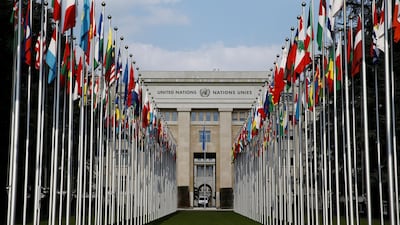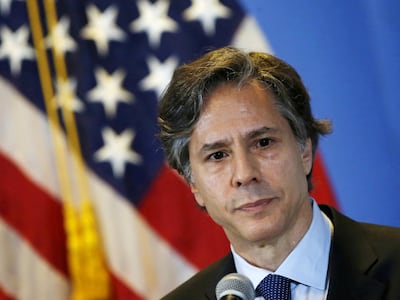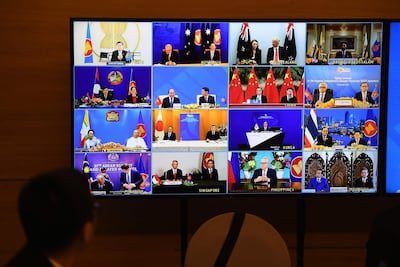This year's G20 meeting, which concluded over the weekend, was always going to be challenging – as is conducting any kind of summitry via video calls. If some commentators judge that not much was accomplished at the event, it would only be fair to point out that US President Donald Trump leaving early to play golf both days hardly helped or showed deep commitment to the business of the gathering.
But for all those fearful about the future of multilateralism, there are three reasons to feel reasonably cheerful.
First, another major intergovernmental forum, the Asia-Pacific Economic Co-operation (Apec) Economic Leaders' Meeting, was held just before the G20 last Friday; and it was a success. The 21-member grouping, which includes the US, China, most of South-East and East Asia, Australia, New Zealand, Canada, Mexico, Chile and Peru, managed to issue their first joint statement since 2017, calling for collaboration to combat Covid-19 and to ensure greater trade and investment.
Mr Trump attended – virtually, as did everyone – which was an unexpected plus, given that he had annoyed many participants by sending Vice President Mike Pence in his place the last time. He also managed not to get into an argument with Beijing at this year's meeting – the reason why Apec had failed to release a statement in 2018.

Under Malaysia’s chairmanship, the attendants launched the Apec Putrajaya Vision 2040 – a roadmap for the next 20 years to make sure that “the Asia-Pacific remains the world’s most dynamic and interconnected regional economy”, which was a significant step as the previous plan, the Bogor Goals, was formulated back in 1994.
An official from China’s Ministry of Commerce was very upbeat about the summit, hailing the meeting as “of landmark significance in Apec co-operation", and saying that “the new vision makes a long-term commitment to supporting a multilateral trading system and demonstrates the resolve to push regional integration".
Second, Chinese officials are not the only ones talking about multilateral systems. Antony Blinken, a veteran of the Obama White House whom President-elect Biden has named as his secretary of State, is a firm believer in intergovernmental institutions and shared problem-solving. He would push for the US to rejoin the Paris climate accords and the World Health Organisation, and conveyed his overview at an open dialogue at the Hudson Institute in Washington last July.
“The big problems that we face as a country and as a planet,” he said, “whether it’s climate change, whether it’s a pandemic, whether it’s the spread of bad weapons: to state the obvious, none of these have unilateral solutions, even a country as powerful as the United States can’t handle them alone. We have to figure out ways to co-operate more effectively.” Mr Blinken has served as deputy secretary of State and deputy national security adviser, and has closely collaborated with Mr Biden for nearly two decades. If the incoming president is preoccupied with America’s internal divisions, as is likely, Mr Blinken could be a very powerful secretary of State if confirmed and his appointment would be a huge shot in the arm for global multilateralism.
Third, enthusiasm for multilateralism appears to be rising all around the world. At the Apec summit President Xi Jinping expressed interest in China joining the Comprehensive and Progressive Trans-Pacific Partnership (CPTPP). As this is the successor trade pact to the Trans-Pacific Partnership that President Barack Obama had led, and which was viewed as being meant to exclude China, that is quite remarkable. Mr Trump withdrew the US from the original version – hence the reformulated CPTPP – but Mr Biden has said he would look at the US signing up, subject to negotiations.
Now a new report published on Monday by Policy Exchange, a highly influential British think tank with strong connections at the top of the Conservative Party, is calling for the UK to do so as well. "A Very British Tilt: Towards a new UK strategy in the Indo-Pacific Region" was written by Policy Exchange's Indo-Pacific Commission, and lest anyone should think this is just a parochial and somewhat quixotic attempt for the UK to find a place in the world post-Brexit, it is important to note who is on the commission.
Its chair is Stephen Harper, the former prime minister of Canada. The foreword is by Japan’s outgoing premier, Shinzo Abe. The commission includes Alexander Downer, Australia’s former foreign minister, Ranil Wickremesinghe, Sri Lanka’s former prime minister, and senior current and former officials from India, the US, New Zealand, Singapore and South Korea. This is a serious statement by figures of stature that Britain should be “invested in the future of the Indo-Pacific, not only in a narrow economic sense but in a deeper strategic sense".
The UK is entitled to seek membership of the CPTPP due to its sovereignty over the tiny Pitcairn Islands, but the report notes that it shares a head of state – in Queen Elizabeth II – with five other countries in the region. In any case, it also urges the UK to take part in what it calls “the informal Quadrilateral Security Dialogue involving Japan, India, Australia and the US”, become a Dialogue Partner with Asean (the Association of South-East Asian Nations), and join Apec whenever possible. It is a highly ambitious call for UK re-engagement east of Suez, and as Britain remains a permanent member of the UN Security Council and the world’s sixth-largest economy, it is a suggestion that would not be without consequence if put into effect.
None of the three points I’ve raised are completely unproblematic. Even without further expansion Apec and the CPTPP will still have to manage internal tensions, and not just between China and the US and its allies. Mr Blinken believes in co-operation but also a “values-based” foreign policy, which will be viewed with suspicion in many Asian capitals. Some may doubt whether the UK retains the capability to project in the manner the Policy Exchange report puts forward.
But taken together, these cases strike me as supporting the argument that multilateralism is in much better shape than is commonly supposed. There is clearly the will. Optimists must hope that a way will be found, too.
Sholto Byrnes is an East Asian affairs columnist for The National




